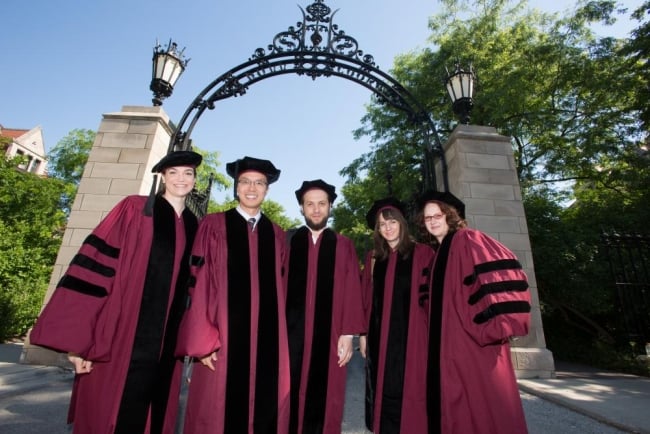You have /5 articles left.
Sign up for a free account or log in.

U. of Chicago students in doctoral gowns
University of Chicago
American universities awarded a record number of doctorates in 2015 -- although the rate of growth in the number of Ph.D. recipients continued a several-year decline. And the 55,006 recipients were more likely to be men and to be American citizens or permanent residents than they were the year before.
Those are among the findings of the newest version of the federally supported Survey of Earned Doctorates, covering the year 2015. The survey, the best available data on Ph.D. graduates, is conducted by NORC at the University of Chicago on behalf of six federal agencies: the National Science Foundation, the National Institutes of Health, the U.S. Department of Education, the U.S. Department of Agriculture, the National Endowment for the Humanities and the National Aeronautics and Space Administration.
The survey provides a slew of demographic and other data about who received Ph.D.s from American universities, which institutions awarded those degrees, how graduates paid for their educations and how they fared in the job market upon finishing.
The number of Ph.D. recipients rose by 1.9 percent in 2015, to 55,006 from 54,003 in 2014 -- the smallest increase since 2011. Nearly 64 percent of them were U.S. citizens or permanent residents, up by about one percentage point from 2014. But the proportion of doctorate recipients who are American remains well below the level it was 15 or more years ago, when the foreign born were a quarter or less of Ph.D. recipients.
The percentage of doctorate recipients who are Hispanic increased by 8.67 percent in 2015, larger than the increase for Asian (6.6 percent), black (4.8 percent) or white Americans (2.5 percent). The proportion of new Ph.D. holders who are men continued to edge up slightly, as it has for much of this decade, to 53.8 percent.
Sixty-two percent of the roughly 49,000 Ph.D. recipients who responded to a question about their post-Ph.D. plans said they had a definitive commitment for employment or postdoctoral study upon earning their degree, slightly up from 2014 but down sharply from 2010, when the figure was 68.1 percent.
There was significant variation by field in those postdegree outcomes. Nearly 70 percent of recipients of math and computer science doctorates and 68.5 percent of psychology and social science Ph.D.s said they had definitive jobs or postdoctoral study positions, compared to 58.6 percent in the life sciences and 54.8 percent in the humanities and arts. The figure was 64.4 percent for education doctorate recipients and 58.2 percent for engineers.
The increase of roughly 1,000 more doctorates granted in 2015 than 2014 can be attributed largely to a handful of fields -- engineering, education and some social sciences, as seen in the table below.
| Subfield of study | 2005 | 2010 | 2014 | 2015 | % Change, 2014-15 |
| All fields | 43,385 | 48,031 | 54,003 | 55,006 | 1.86% |
| Life sciences | 9,310 | 11,319 | 12,484 | 12,520 | 0.29% |
| Agricultural sciences and natural resources | 1,160 | 1,100 | 1,338 | 1,439 | 7.55% |
| Biological and biomedical sciences | 6,367 | 8,046 | 8,867 | 8,801 | -0.74% |
| Health sciences | 1,783 | 2,173 | 2,279 | 2,280 | 0.04% |
| Physical sciences and earth sciences | 4,359 | 4,995 | 5,912 | 5,924 | 0.20% |
| Chemistry | 2,126 | 2,304 | 2,673 | 2,675 | 0.07% |
| Geosciences, atmospheric and ocean sciences | 714 | 862 | 1,099 | 1,057 | -3.82% |
| Physics and astronomy | 1,519 | 1,829 | 2,140 | 2,192 | 2.43% |
| Mathematics and computer sciences | 2,334 | 3,223 | 3,863 | 3,825 | -0.98% |
| Computer and information sciences | 1,129 | 1,633 | 1,989 | 2,005 | 0.80% |
| Mathematics and statistics | 1,205 | 1,590 | 1,874 | 1,820 | -2.88% |
| Psychology and social sciences | 7,149 | 7,883 | 8,752 | 9,095 | 3.92% |
| Psychology | 3,322 | 3,421 | 3,724 | 3,782 | 1.56% |
| Social sciences | 3,827 | 4,462 | 5,028 | 5,313 | 5.67% |
| -- Anthropology | 456 | 507 | 524 | 493 | -5.92% |
| -- Economics | 1,061 | 1,073 | 1,196 | 1,256 | 5.02% |
| -- Political science and government | 618 | 728 | 777 | 859 | 10.55% |
| -- Sociology | 536 | 639 | 679 | 745 | 9.72% |
| -- Other social sciences | 1,156 | 1,515 | 1,852 | 1,960 | 5.83% |
| Engineering | 6,426 | 7,578 | 9,633 | 9,897 | 2.74% |
| Education | 6,227 | 5,288 | 4,791 | 5,117 | 6.80% |
| Humanities and arts | 5,187 | 5,016 | 5,526 | 5,600 | 1.34% |
| -- Foreign languages and literature | 607 | 601 | 674 | 656 | -2.67% |
| -- History | 924 | 1,005 | 1,186 | 1,145 | -3.46% |
| -- Letters (English, classics, etc.) | 1,389 | 1,516 | 1,552 | 1,590 | 2.45% |
| -- Other humanities and arts | 2,267 | 1,894 | 2,114 | 2,209 | 4.49% |
| Business management and administration | 1,171 | 1,366 | 1,583 | 1,588 | 0.32% |
| Communication | 488 | 638 | 663 | 668 | 0.75% |
| Non-S&E fields not elsewhere classified | 733 | 725 | 796 | 772 | -3.02% |
As has long been the case, a small set of American universities produces a disproportionate share of Ph.D. recipients. Below are the 25 institutions that awarded the most doctorates in 2015.
| U of Michigan at Ann Arbor | 852 |
| U of Texas at Austin | 841 |
| U at Wisconsin at Madison | 836 |
| U at California, Berkeley | 811 |
| U of Illinois at Urbana-Champaign | 781 |
| U of Florida | 747 |
| U of California, Los Angeles | 744 |
| Texas A&M U | 732 |
| Ohio State U | 726 |
| Harvard U | 715 |
| Purdue U | 714 |
| U of Minnesota-Twin Cities | 711 |
| Pennsylvania State U | 694 |
| Stanford U | 689 |
| U of Washington | 666 |
| U of Maryland at College Park | 619 |
| Massachusetts Institute of Technology | 606 |
| Michigan State U | 597 |
| Walden U | 562 |
| U of California, Davis | 539 |
| Georgia Institute of Technology | 526 |
| U of California, San Diego | 501 |
| Johns Hopkins U | 492 |
| U of North Carolina at Chapel Hill | 492 |
| U of Arizona | 485 |
Some universities have strong track records of awarding doctorates to members of underrepresented minority groups. Twenty institutions are responsible for nearly a third of the roughly 11,000 Hispanic and Latino Ph.D. holders produced by American universities from 2011 to 2015, for instance; six of the top 13 were campuses of the University of California, and the top 10 are below.
| U of California, Berkeley | 293 |
| U of California, Los Angeles | 246 |
| U of Puerto Rico, Rio Piedras | 240 |
| U of Texas at Austin | 228 |
| U of Florida | 192 |
| Texas A&M U, College Station and Health Science Center | 187 |
| U of Arizona | 177 |
| CUNY, Graduate Center | 175 |
| U of Michigan at Ann Arbor | 174 |
| U of California, San Diego | 172 |
The same is true for African-American Ph.D.s, and below are the 10 institutions that have produced the most doctorate holders in that group over the last five years.
| Walden U | 682 |
| Howard U | 354 |
| U of Michigan at Ann Arbor | 149 |
| Jackson State U | 135 |
| Texas A&M U, College Station and Health Science Center | 133 |
| U of Georgia | 130 |
| U of South Carolina at Columbia | 124 |
| Auburn U, Auburn | 120 |
| Georgia State U | 120 |
| U of Maryland, College Park | 119 |
Other highlights of the survey:
- The proportion of all Ph.D. recipients who graduated with no debt increased by 5 percent, while the share who completed their degrees with $10,000 or less in debt grew by 8.2 percent and the proportion who finished with at least $30,000 in debt rose by 0.26 percent.
- About a third of all doctorate recipients in 2015 listed their primary source of financial assistance as being a research assistantship or traineeship, followed by 27.3 percent who said fellowships or grants, 20.7 percent teaching assistantships, and 15.3 percent their own resources. Men were significantly likelier than women (37 to 26 percent) to identify research positions as their primary financial resource, while women were nearly twice as likely as men (20.2 percent to 11.1 percent) to say they supported themselves.
- About 12.5 percent of all doctorate recipients in 2015 had attended a community college.





